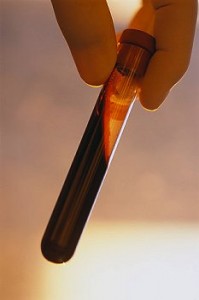 Scientists have yet to find the magic cure for cancer, but they may have found a way to beat it at its own game. Any doctor worth his merits knows the main element of attack is surprise and if he can sneak up on the disease before it wields its best weapon, the battle is much easier to win. The biotechnology company, Chronix Biomedical is pioneering a breakthrough approach to the diagnosis, monitoring and management of a broad range of cancers and other conditions. It has developed technology that measures and categorizes DNA sequences circulating in the blood that are associated with specific changes in disease and health status. More specifically, scientists have developed a blood test that can detect very early stages of breast and prostate cancer and can overcome the limitations of older tests.
Scientists have yet to find the magic cure for cancer, but they may have found a way to beat it at its own game. Any doctor worth his merits knows the main element of attack is surprise and if he can sneak up on the disease before it wields its best weapon, the battle is much easier to win. The biotechnology company, Chronix Biomedical is pioneering a breakthrough approach to the diagnosis, monitoring and management of a broad range of cancers and other conditions. It has developed technology that measures and categorizes DNA sequences circulating in the blood that are associated with specific changes in disease and health status. More specifically, scientists have developed a blood test that can detect very early stages of breast and prostate cancer and can overcome the limitations of older tests.
The most significant problem in treating a cancer patient is in regards to late diagnosis, which results from difficulties seeing the existence of cancer during the early stages of its development. Cancer cure rates would improve if the diagnostic tests yielded positive results before the spread of the cancer to other parts of the body. But, few tests are observed to be positive before the spread of cancer and this is especially unfortunate since many cancers have a very high cure rate if caught early.
In addition to increasing survival, effective early diagnosis can reduce, by far, the costs to the medical systems, associated with elaborate tests and prolonged and expensive treatments. With Chronix’s approach, there is no need for invasive tests to obtain tissue from a patient, but instead, a simple blood sample is sufficient for analyzing fragments of DNA released into the bloodstream by dying cancer cells, leveraging the early event in the growth of cancer cells known as apoptosis, or cell death. Chronix is using its advanced DNA sequencing platforms to measure alterations in cancer-specific regions of the chromosome, which can be detected as distinctive “signatures” in the blood-borne DNA. By focusing on these highly specific cancer signatures, Chronix’s tests can detect the early presence of cancer in simple blood samples.
Data from a clinical trial testing 575 individuals showed that the Chronix diagnostic technique detected breast cancer and prostate cancer with a level of accuracy that surpasses the reported accuracy of current diagnostic tests. “Unlike cancer biomarkers that focus on static genomic data, our tests based on serum apoptotic DNA tap into the dynamic information provided by the genomic alterations that are unique for each and every cancer cell, thereby capturing what is happening to the DNA very early in the disease process, patient-by-patient and in real time,” said Dr. Urnovitz. “These epigenomic signatures captured by the Chronix tests can be used to detect early disease recurrence, and they also can provide information about the disease process to help physicians choose the most appropriate treatment for that patient, making personalized medicine a near-term reality rather than a distant possibility.”
Dr. Urnovitz added, “Our ‘For Investigational Use Only’ testing service is currently making the Chronix technology available to cancer researchers to monitor the status of patients in their clinical trials with a high level of sensitivity and specificity. We are working with these researchers and building partnerships with other oncologists and research institutions to further validate our breast and prostate cancer tests and to generate data on additional cancer indications. We believe that our epigenomic approach based on blood-borne apoptotic DNA has breakthrough potential for the early diagnosis of multiple types of cancer, as well as for helping to improve the effectiveness of cancer treatment. We look forward to working with a variety of collaborators to accelerate its development.”
The World Health Organization reported that “cancer will soon overtake heart disease as the world’s top killer, part of a trend that should more than double global cancer cases and deaths by 2030”. In 2009, 1 in 4 deaths in the United States was due to some form of cancer. Cancer testing is one of the most important growth opportunities for the next three to five years in the diagnostics segment. The National Cancer Institute estimates that about ten million Americans have or have had some form of cancer. Overall costs of the disease are $126 billion annually.
With this new development, real individuals can have a greater hope in surviving this disease that has previously been a death sentence for many. While the day when cancer can be viewed as nothing more than an inconvenient illness that can be treated quickly and efficiently may still be far off, scientists are fast approaching that goal and will hopefully reach there sooner, rather than later.